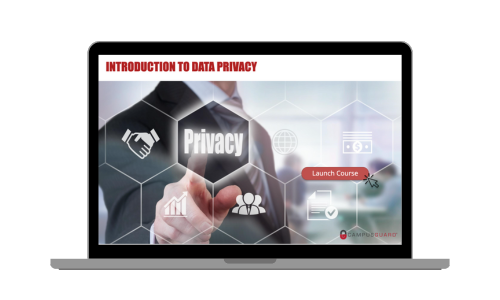Data Privacy Training Course
Ensure proper data handling to minimize potential risks and maintain compliance with data privacy regulations
Data Privacy Course Description
Data privacy training reviews data privacy regulations, best practices, and internal policies, aimed at ensuring employees understand how to handle sensitive information and prevent breaches.
- Target Audience: Any users who handle personal data, manage online systems, or interact with sensitive information should receive regular training on data privacy principles and best practices.
- Course Length: 45 minutes
Data Privacy Course Learning Objectives
Understand proper data handling practices to reduce potential risks and ensure compliance with data privacy regulations. Recognize the importance of fostering a culture of data protection across the organization to support long-term security and trust.

Data Privacy Awareness Course Modules
Our Data Privacy course is designed with micro-learning modules, making the content easier to retain. You can choose to launch the training all at once or roll it out throughout the year to fit your team’s schedule.
-
An Introduction to Data Privacy
This module introduces the concept of data privacy, explaining its importance for both individuals and organizations. -
Impact of Emerging Technologies
This module addresses how technologies like AI and IoT affect data privacy, highlighting potential risks and necessary precautions. Employees are taught to avoid using personal data in AI tools and to ensure all technologies comply with privacy standards. -
Privacy Regulations at a Glance
This training reviews major privacy regulations like FERPA, GDPR, and CCPA, emphasizing their key principles and organizational obligations for compliance. -
Common Scenarios
The training includes real-world scenarios demonstrating privacy violations and lessons learned from them. Examples include accidental data sharing and unauthorized access. -
Data Privacy Best Practices
This module addresses common risks to personal data and outlines best practices for data handling to prevent breaches, as well as how to recognize suspicious activities and follow incident reporting procedures.
 Explore our other courses
Explore our other courses
Explore our full course library to find training that fits your needs, from security awareness and compliance essentials to specialized topics designed to support your role and responsibilities. Whether you’re looking to strengthen your cybersecurity posture, stay up to date with industry regulations, or broaden your knowledge, we’ve got you covered.
New Data Privacy Course
We are now offering a Data Privacy course that aims to equip employees with the knowledge and skills to protect personal data effectively and ensure ongoing compliance with privacy laws.
Any users who handle personal data, manage online systems, or interact with sensitive information should receive regular training on data privacy principles and best practices.
Request a DemoRelated Products and Services
Equip Employees to Spot and Manage Risk
CampusGuard’s Data Privacy course empowers your staff to protect personal data, comply with privacy laws, and support a culture of data protection.
Data Privacy Training Frequently Asked Questions
Data privacy training educates employees on how to handle personal and sensitive information securely, in compliance with laws, regulations, and company policies.
All employees who handle, access, or process personal data—including administrative staff, faculty, IT teams, and leadership.
Training helps prevent data breaches, ensures compliance with regulations like GDPR, FERPA, HIPAA, or GLBA, and builds trust with students, customers, and partners.
It depends on the organization, but typically includes GDPR, CCPA, HIPAA, FERPA, GLBA, and industry-specific standards.
Data privacy training should be completed at least annually, with refreshers whenever laws, policies, or risks change.
Personally Identifiable Information (PII), financial records, health data, education records, login credentials, and any information that could identify an individual.
It teaches best practices such as secure password management, recognizing phishing attempts, proper data storage, and rules for sharing information.


